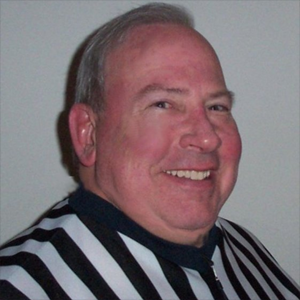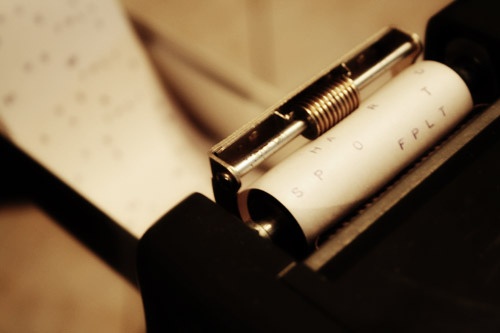
Rndballref
20 Years Experience
Chicago, IL
Male, 60
For twenty years I officiated high school, AAU and park district basketball games, retiring recently. For a few officiating is the focus of their occupation, while for most working as an umpire or basketball referee is an avocation. I started ref'ing to earn beer money during college, but it became a great way to stay connected to the best sports game in the universe. As a spinoff, I wrote a sports-thriller novel loosely based on my referee experiences titled, Advantage Disadvantage
1) For most officials, the block/charge is the toughest because the action happens so quickly and to really get the call right, the official should not be looking at the dribbler (ref's would say, officiate the defense). It's natural to watch the offense, but a clear, solid call happens when the official focuses on the defense. 2) for young refs it is striking the balance between being an over the top tough guy vs getting walked on for being weak. 3) especially at the lower levels, deciding what not to call is hard to learn - my generalization is that new refs overcall violations and are reluctant to call fouls.
No it is not correct. There are 2 restrictions on non-jumpers beside the one about being adjacent if the other team wants in. Once the referee is ready to toss the ball, and until the ball is tossed, a non-jumper shall not 1) move around the circle, and 2) move onto the circle from away. So a non-jumper can stand behind an opponent as long as he does not infringe on the opponent's right to his vertical space.
I try to NOT call 3 seconds unless it changes the advantage/disadvantage of the play. If I am underneath the basket as the lead official and someone is camped out in the paint, I will try to talk him out. However, let's suppose that a player camps out for more than 3 seconds and a shot from far away goes up, and the player in the lane gets the rebound I will call a late 3 seconds violation - because his being in the lane for more than 3 seconds allowed him an unearned rebound.
In your scenario, assuming the ball is in the frontcourt for all of time the player is in the lane and that there was no shot previous to the airball, it should be called a 3 second violation - in my mind a perfect late call, because if the other team gets the rebound play on. If the guy camped out in the lane gets the ball, then whistle a turnover.
Oh one more clarification: the 3 second area is the rectangle outline from the free line to the end line. It does not include the semi-circle where a free throw shooter must stand. That is the top section of the "key" is not in the 3 seconds area.
A foul committed after the ball is "dead" is ignored by rule book unless it is flagrant or intentional. The official must determine which happened first, the time out request or the foul. If the foul was committed first, they should report the foul and then the official should ask the coach if they still want the time out or not. If the time out was granted first, and the foul was neither intentional or flagrant then the foul is ignored. If the foul during a dead ball is intentional or flagrant it is a technical foul.
Sommelier
 What's your favorite bottle of wine for under $20?
What's your favorite bottle of wine for under $20?
Waitress
 Do you get annoyed when people use Groupons?
Do you get annoyed when people use Groupons?
Court Reporter
 How do you transcribe when people in the courtroom are talking over and interrupting each other?
How do you transcribe when people in the courtroom are talking over and interrupting each other?
I try not to, but it happens. If a player challenges me I won't back down even in a big game. Being perceived as a punk player can only work to your detriment.
Unless the mechanic changed this year, the lead official is never to bounce to the player on a throw in with one exceptionL if the ball goes out of bounds on the sideline very close to the endline (baseline), the the lead can bounce the ball for a throw in close to the endline. If however the ball will be put in play on the endline, the lead should always hand the ball to the thrower. I know in the NBA they bounce the ball for an endline throw-in in the backcourt, but not in high school ball (except by lazy officials).
Technically a coach is not allowed on the court and the penalty is a technical foul. But here is where experience matters. If a coach breached inbounds but was not inyerferring with the play he should be gently directed back to the bench. If he is in the way of a play or a ref then a T should be called. Even on a time out I would not let a coach come onto the court - instead I would walk back to the bench and the coach always follows. A coach puposely charging a ref on a court is the coach's way of showing up a ref and should noy be tolerated - but does not have to be a T.
-OR-
 Login with Facebook
Login with Facebook (max 20 characters - letters, numbers, and underscores only. Note that your username is private, and you have the option to choose an alias when asking questions or hosting a Q&A.)
(A valid e-mail address is required. Your e-mail will not be shared with anyone.)
(min 5 characters)
By checking this box, you acknowledge that you have read and agree to Jobstr.com’s Terms and Privacy Policy.
-OR-
 Register with Facebook
Register with Facebook(Don't worry: you'll be able to choose an alias when asking questions or hosting a Q&A.)